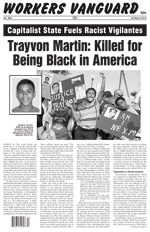
Those Who Labor Must Rule! (Quote of the Week) In the midst of a hard-fought 1936-37 West Coast maritime strike, Trotskyist leader James P. Cannon emphasized that labor can advance its cause only by relying on its own class strength and solidarity against the capitalist class enemy. Ben Hanford, who is referred to in the selection below, was a leader of the U.S. Socialist Party in the early 20th century. A good deal is said about strike “strategy”—and that has its uses within certain clearly defined limits—but when you get down to cases this strike, like every other strike, is simply a bullheaded struggle between two forces whose interests are in constant and irreconcilable conflict. The partnership of capital and labor is a lie. The immediate issue in every case is decided by the relative strength of the opposing forces at the moment. The only strike strategy worth a tinker’s dam is the strategy that begins with this conception. The problem of the strikers consists in estimating what their strength is, and then mobilizing it in full force and pressing against the enemy until something cracks and a settlement is achieved in consonance with the relation of forces between the unions and the organizations of the bosses. That’s all there is to strike strategy. You cannot maneuver over the head of the class struggle. We pass over entirely the question of who is “right” in the maritime strike, for we believe with Ben Hanford that the working class is always right. From our point of view the workers have a perfect right to the full control of industry and all the fruits thereof. The employers on the other hand—not merely the shipowners; all bosses are alike—would like a situation where the workers are deprived of all organization and all say about their work and are paid only enough to keep body and soul together and raise a new generation of slaves to take their places when they drop in their tracks. Any settlement in between these two extremes is only a temporary truce and the nature of such a settlement is decided by power; “justice” has nothing to do with it. The workers will not have justice until they take over the world. The demands of the workers in a strike are to be judged solely by their timeliness and the way they fit realistically into the actual relation of forces at the time. —James P. Cannon, “The Maritime Strike” (November 1936), reprinted in Notebook of an Agitator (1958)
|
|
|||||||||||||||||||||||||||||||||||||||||||||||


